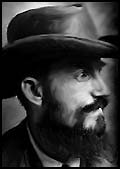Arms and the Man I sing, who forc'd by fate,
And haughty Juno's unrelenting hate,
Expell'd and exil'd, left the Trojan shore,
Long labors, both by sea and land, he bore,
And in the doubtful war, before he won
the Latian realm, and built the destin'd town,
His banish'd gods restor'd to rites divine,
And settled sure succession in his line,
From whence the race of Alban fathers came,
And the long glories of majestic Rome.
King Edward VII hated Arms and the Man when he first saw it in 1894. He thought it made fun of British soldiers and accused them of cowardice. Shaw, of course, was mocking the institution of war and not the average soldier. Shaw himself said his play was about pathetically underdeveloped countries like Ireland (even though it is all set in Bulgaria), and the clash between the practical, newly emerging capitalism of a nation struggling out of the Middle Ages, and the idealistic romanticism of valor and courtly love that Middle Age thought represented.
This play is the first "serious farce." It uses the melodrama and stock situations popular in the theatre at the time, to satirize war and the dreams and love and glory used to camouflage it. It has become increasingly difficult to join our dreams and ideals with ugly reality -- like the Petkoffs, their servants, and the Swiss soldier, we make the most of our circumstances. Like Sergius, we may become bitter; but like Raina, we must embrace the change. But this is no dry political diatribe. Shaw was too smart for that -- it is a play full of optimism, humor, farce, and sexual energy, with real people in farcical situations that are very human and familiar today. The play is, in a way, a comedy about post-tramatic stress syndrome when no one knew the meaning of the phrase. In his afterpiece, Shaw said: "I can no longer be satisfied with fictitious morals and fictitious good conduct shedding fictitious glory on commonplaces of civilisation which drive men..." He asks us to "respect ourselves by respecting reality."

George Bernard Shaw